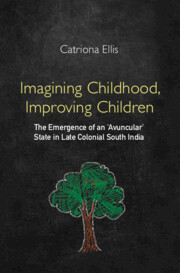 Imagining Childhood, Improving Children
Imagining Childhood, Improving Children Book contents
- Frontmatter
- Dedication
- Contents
- Acknowledgements
- List of Abbreviations
- Introduction
- 1 The Child at School: Compulsory Education in the Madras Presidency
- 2 Educating the Child: The Introduction of Compulsory Education in Madras City
- 3 Imagining the Child as Learner: Progressive Pedagogy in the Madras Presidency
- 4 Producing the Healthy Schoolchild
- 5 Saving the Child: The Madras Children Act, 1920, and the Beginnings of a Juvenile Justice System
- 6 Protecting the Poor Child: The Practical Expansion of Juvenile Justice
- 7 Defining Childhood: Sexual Parameters of Childhood
- 8 Remembering Childhoods: Childhood Memories in Autobiographies
- Conclusion: Children, Childhood and the Growth of the Avuncular State in South India
- Notes
- Bibliography
- Index
Introduction
Published online by Cambridge University Press: 19 April 2023
- Frontmatter
- Dedication
- Contents
- Acknowledgements
- List of Abbreviations
- Introduction
- 1 The Child at School: Compulsory Education in the Madras Presidency
- 2 Educating the Child: The Introduction of Compulsory Education in Madras City
- 3 Imagining the Child as Learner: Progressive Pedagogy in the Madras Presidency
- 4 Producing the Healthy Schoolchild
- 5 Saving the Child: The Madras Children Act, 1920, and the Beginnings of a Juvenile Justice System
- 6 Protecting the Poor Child: The Practical Expansion of Juvenile Justice
- 7 Defining Childhood: Sexual Parameters of Childhood
- 8 Remembering Childhoods: Childhood Memories in Autobiographies
- Conclusion: Children, Childhood and the Growth of the Avuncular State in South India
- Notes
- Bibliography
- Index
Summary
Geneva Declaration of the Rights of the Child, 1924
According to the present Declaration of the Rights of the Child, commonly known as ‘Declaration of Geneva’, men and women of all nations, recognising that mankind owes to the Child the best that it has to give, declare and accept it as their duty that, beyond and above all considerations of race, nationality or creed:
1. the child must be given the means requisite for its normal development, both materially and spiritually;
2. the child that is hungry must be fed; the child that is sick must be nursed; the child that is backward must be helped; the delinquent child must be reclaimed; and the orphan and the waif must be sheltered and succoured;
3. the child must be the first to receive relief in times of distress;
4. the child must be put in a position to earn a livelihood, and must be protected against every form of exploitation;
5. the child must be brought up in the consciousness that its talents must be devoted to the service of fellow men.
The Geneva Declaration of 1924 was the first coherent definition of modern childhood, its rights and privileges, to be widely accepted among the international community. The declaration was based on the supposedly self-evident assumption that childhood was a natural stage of life, that all children were equal, that all followed a similar development pattern and that all were deserving of the same protections and assistance. Together they positioned the modern child as vulnerable, sexually innocent, playful, in Zelizer's well-used phrase ‘economically worthless though emotionally priceless’ and with a right to the resources of the state and even the international community. This book considers the conceptual and practical implications of these ideas in the south Indian context by assessing how they came to be widely accepted as universal in state policy and among the professional and humanitarian elites.
The central contention of this book is that this construction of universal modern childhood became normative in state discourse and policy in south India during the 1920s and 1930s. Age was established as both a category of governance and a new form of collective identity in legislation and policies enacted as a result of the devolution of limited powers to politically moderate Indians under the constitutional changes of 1919.
- Type
- Chapter
- Information
- Imagining Childhood, Improving ChildrenThe Emergence of an ‘Avuncular’ State in Late Colonial South India, pp. 1 - 23Publisher: Cambridge University PressPrint publication year: 2023


